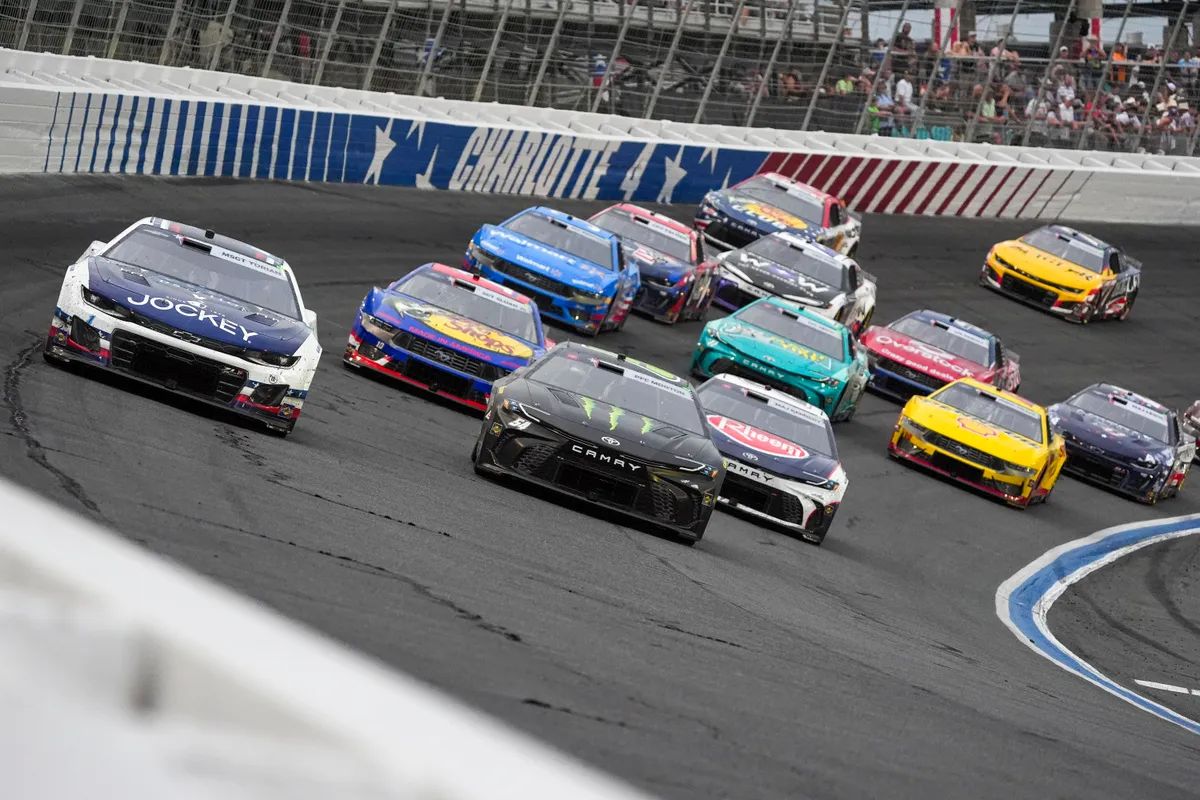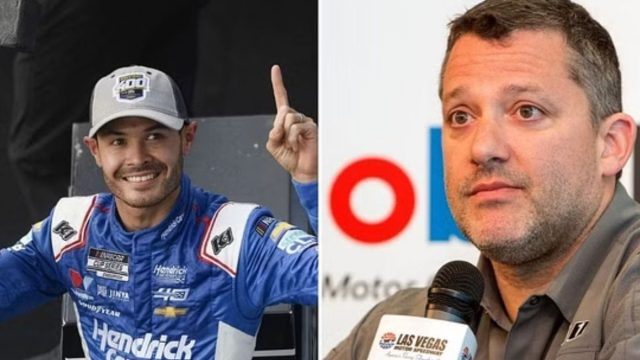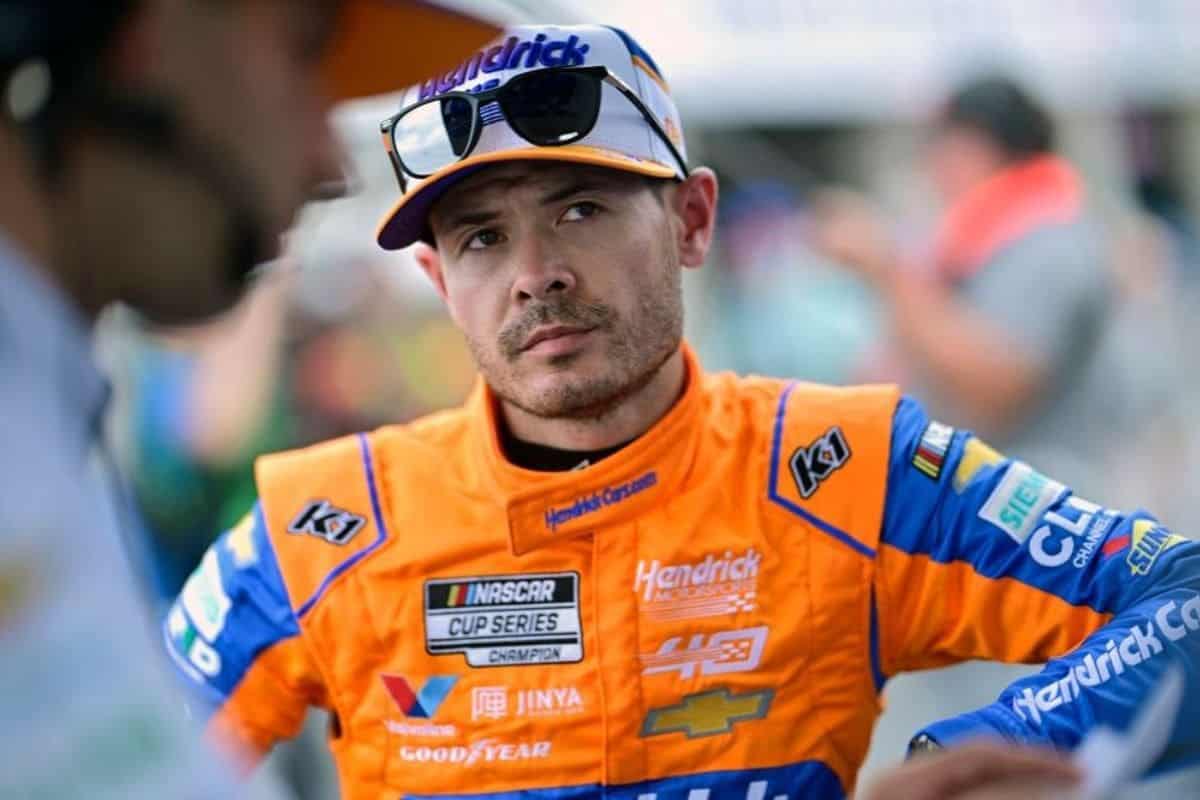NASCAR President Compares Kyle Larson to Toney Stewart: The recent remarks by NASCAR President Steve Phelps, which liken Kyle Larson to the legendary Tony Stewart, highlight a crucial moment in the series as Larson’s multifaceted skill set continues to shine. This comparison enhances Larson’s status and casts a shadow over Chase Elliott‘s championship ambitions, raising important questions about the current competitive landscape. As Larson’s momentum builds, the implications for Elliott’s title defense become increasingly notable. How will this rivalry unfold, and what does it mean for the future of NASCAR? The answers may reshape the dynamics of the sport.
Key Highlights
- NASCAR President Steve Phelps highlights Kyle Larson’s versatility, drawing comparisons to Tony Stewart’s competitive legacy.
- Chase Elliott faces heightened popularity expectations, similar to Dale Earnhardt Jr., impacting his championship defense.
- Larson’s adaptability across multiple racing formats positions him as a significant threat to Elliott’s title.
- Current performance metrics indicate a competitive landscape, with Larson and other drivers challenging Elliott’s standings.
- Fan reactions reflect concerns over Elliott’s championship reign as Larson’s capabilities gain recognition and support.
Driver Popularity and Team Considerations
Driver popularity is a vital factor in the decision-making processes of NASCAR teams, influencing not only driver contracts but also sponsorship opportunities. In a highly competitive racing environment, teams must carefully evaluate the marketability of potential drivers, as a driver’s popularity can greatly improve a team’s visibility and revenue streams. This is particularly relevant when considering the financial backing that sponsors are willing to provide.
A driver with a strong fan base and public appeal can attract lucrative sponsorship deals, which in turn can afford teams the resources necessary to field competitive cars. Conversely, teams may hesitate to sign a talented driver who lacks a solid following, as this could limit their ability to secure fundamental funding. The correlation between driver popularity and team success becomes evident when analyzing the dynamics of the sport; notable examples highlight how fan engagement can propel both individual drivers and their teams to new heights.
Additionally, the role of social media cannot be overlooked. In today’s online environment, a driver’s online presence often serves as a barometer for their popularity and marketability. Teams are increasingly leveraging data analytics to gauge fan engagement, which further informs their hiring decisions.
Ultimately, driver popularity is not merely a superficial metric; it is a tactical asset that can dictate the path of a team’s performance and financial stability within the NASCAR ecosystem. Therefore, it remains a critical consideration that teams must navigate judiciously.

Steve Phelps on Larson vs. Elliott
In the ongoing discourse surrounding driver popularity in NASCAR, Steve Phelps, the organization’s president, recently weighed in on the competitive dynamics between Kyle Larson and Chase Elliott. Phelps’s insights emerged during an appearance on Kevin Harvick’s Happy Hour, where he was prompted to assess the popularity of these two prominent drivers.
Addressing Larson’s versatility, Phelps remarked, “If he wants to race anything, [he will], and he has,” highlighting Larson’s ability to excel across different racing formats. This adaptability positions Larson as a formidable competitor not just against Elliott, but also within the broader landscape of motorsport, including comparisons to Max Verstappen.
Phelps further elaborated on Larson’s achievements, drawing parallels with Tony Stewart, suggesting that while Larson may lack a larger-than-life persona, his proficiency remains unmatched.
Conversely, Phelps acknowledged the weight of expectation on Elliott, who embodies the burdens of popularity akin to that once carried by Dale Earnhardt Jr. According to Phelps, Elliott’s current path differs from Larson’s, as he is not engaging in the same breadth of racing opportunities.
“Chase Elliott, on the other hand, isn’t doing all those things.” – Phelps
While Phelps refrained from declaring a definitive winner in the popularity contest, his remarks illuminate the evolving narrative between Larson and Elliott. As fans continue to deliberate their respective merits, the question of who reigns supreme remains tantalizingly open.
Larson vs. Verstappen Debate
The rivalry between Kyle Larson and Max Verstappen has ignited passionate discussions among motorsport enthusiasts, particularly following Larson’s bold assertion that he considers himself the superior all-around driver. This statement not only sparked debate but also highlighted the contrasting worlds of NASCAR and Formula 1, where each driver excels in their respective disciplines.
Larson’s claim stems from his versatility on the NASCAR grid, where he has proven himself capable of mastering different racing formats, from dirt tracks to superspeedways. His confidence in his skill set reflects a deep-seated belief in the adaptability required to thrive across diverse racing environments.
However, this self-assurance invites scrutiny, particularly when contrasted with Verstappen, a driver whose skill in Formula 1 has redefined modern racing.
Verstappen’s neutral response to Larson’s assertion—acknowledging that “everyone is good in their own right”—suggests a level of respect for his counterpart while simultaneously sidestepping the competitive tension. This response highlights the importance of context in any comparison; Larson’s achievements in NASCAR cannot be directly measured against Verstappen’s dominance in F1. Each operates under distinct rules, vehicles, and racing cultures.
Verstappen’s Response and Comparison
Max Verstappen’s measured response to Kyle Larson’s assertion highlights a notable aspect of their rivalry: the appreciation for each other’s unique skill sets within their respective disciplines.
The three-time Formula 1 world champion acknowledges Larson’s skill in dirt racing, admitting that he would require substantial practice to compete effectively in that arena. This acknowledgment not only demonstrates Verstappen’s humility but also his respect for Larson’s versatility as a driver.
Both drivers excel in different racing formats, but Larson’s adaptability across differing disciplines sets him apart. Verstappen’s experience is primarily concentrated in go-karting and high-speed circuit racing, whereas Larson’s resume highlights a broad spectrum of competitive environments.
In light of this, several factors emphasize Larson’s versatility:
- Diverse Experience: Larson has successfully competed in trucks, stock cars, and IndyCar, illustrating his ability to navigate varying racing styles and conditions.
- Skill Transferability: His expertise in different types of racing boosts his complete driving skill, allowing him to excel in any format he chooses.
- Adaptability: Larson’s ability to quickly adjust his techniques for different vehicles and race types is a reflection of his exceptional talent.
- Pundit Support: The backing from NASCAR commentators further cements Larson’s reputation as a versatile driver, emphasizing that adaptability is vital in motorsport.
Fan Opinions and Future Matchups
As fans enthusiastically anticipate potential matchups between Kyle Larson and Max Verstappen, discussions surrounding their comparative skills ignite passionate debates within the motorsport community. Both drivers represent the pinnacle of their respective disciplines, yet they operate under different paradigms—Larson in NASCAR‘s high-octane ovals and Verstappen in Formula 1‘s intricate road courses.
The prospect of a head-to-head competition stirs excitement, yet it also raises questions about what constitutes the “best driver in the world.”
Supporters of Larson often point to his remarkable adaptability and ability to master diverse racing formats, highlighting his recent comparisons to the legendary Tony Stewart. His skill in short-track racing and ability to navigate through the field effectively showcase a multifaceted talent.
Conversely, Verstappen’s skillfulness in high-speed precision and overtaking tactics has catapulted him to the forefront of F1, where his aggressive racing style and tactical insight have redefined expectations for modern drivers.
The lack of direct competition between these two giants leaves ample room for speculation, but it is crucial to recognize that greatness can manifest in many forms. Fan opinions will likely diverge based on personal preferences for racing styles, team dynamics, and even national pride.
As discussions flourish, it becomes increasingly clear that while Larson and Verstappen may excel in different arenas, their legacies will continue to shape the path of motorsport. Ultimately, the debate about who deserves the title of the best driver will remain as thrilling as the races themselves.
News in Brief: NASCAR President Compares Kyle Larson to Toney Stewart
The comparison drawn by NASCAR President Steve Phelps between Kyle Larson and Tony Stewart highlights the evolving competitive dynamics within NASCAR. As Larson demonstrates remarkable versatility, questions arise regarding Chase Elliott’s championship standing. The implications of this rivalry extend beyond individual performances, potentially reshaping team strategies and fan engagement. With Larson’s rising prominence, the landscape of NASCAR appears poised for considerable transformation, compelling stakeholders to reassess their positions in the pursuit of championship glory.
ALSO READ: NASCAR Charter Talks Heat Up: Steve Phelps Drops Game-Changing Insights!


